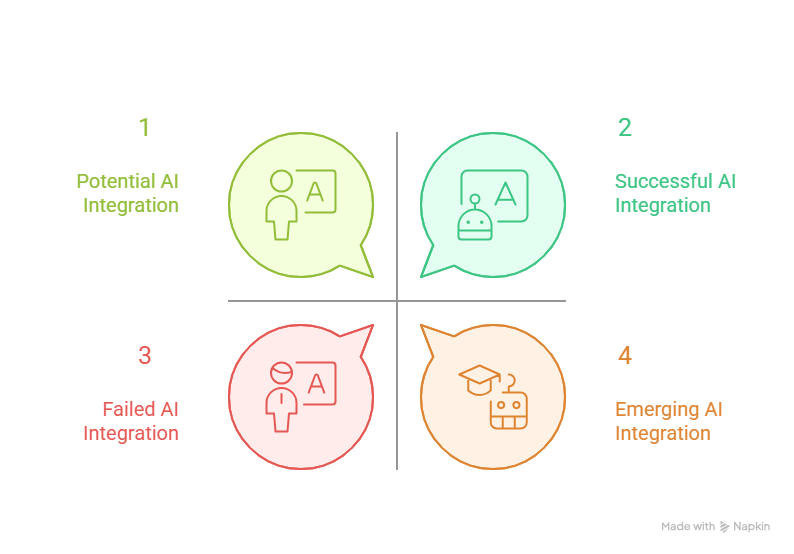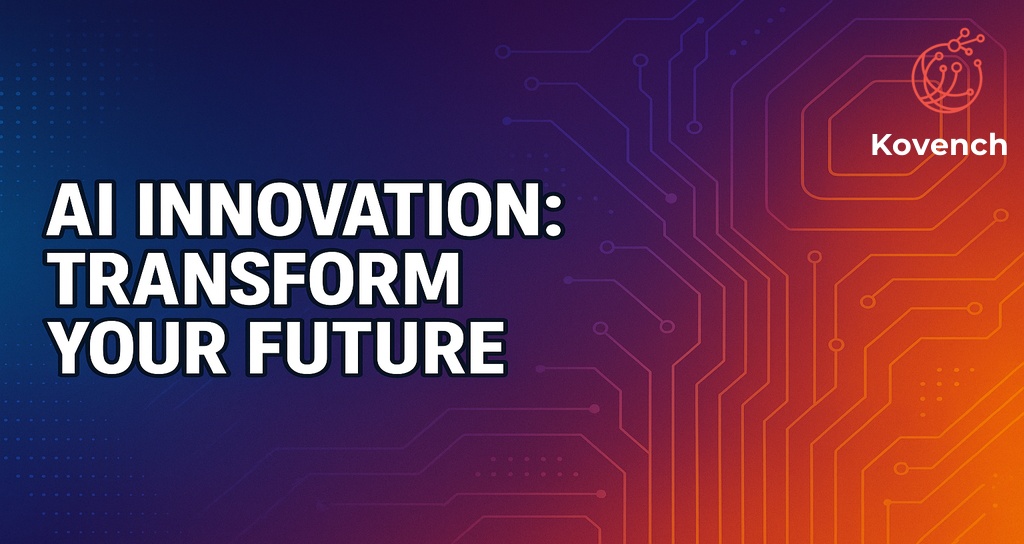Table Of Contents
1. Introduction
Traditional grading often struggles with delays, inconsistencies, and bias, challenging educators and students alike. In fact, teachers spend up to 12 hours per week on grading, with some studies reporting that over 60% of teachers feel grading tasks are time-consuming and tedious . AI-assisted grading emerges as a transformative solution, offering faster, fairer, and smarter assessments. According to a report by McKinsey, AI can reduce grading time by up to 90% and improve grading consistency, eliminating human errors and biases in the process.
By automating routine evaluation tasks, AI enhances efficiency while promoting objectivity and personalized feedback. In fact, AI systems can assess complex assignments such as essays and projects in a fraction of the time it takes humans, offering detailed, data-driven feedback tailored to each student’s performance. At Kovench, we leverage our expertise in AI to help educational institutions implement these advanced grading systems, ultimately unlocking new possibilities for education and driving greater ROI.
1.1 What is AI-Assisted Grading?
AI-assisted grading uses AI and machine learning to evaluate and score student assessments quickly and consistently, reducing manual effort and human bias. It handles various formats, from multiple-choice to essays, by applying algorithms like natural language processing to analyze responses against predefined rubrics. This technology enables faster feedback, improves grading fairness, and allows educators to focus more on teaching than on routine marking tasks. Kovench's solutions in AI-assisted grading not only streamline the evaluation process but also enhance the overall educational experience, leading to improved student outcomes.
1.2 The Role of AI in Education
AI plays a transformative role in education by personalizing learning experiences, automating administrative tasks, and supporting teachers with tailored resources. It adapts content to individual student needs, provides instant feedback, and makes education more inclusive through assistive technologies. AI-powered tools also streamline grading and scheduling, freeing educators to focus on instruction and engagement. At Kovench, we understand the importance of these capabilities in enhancing teaching effectiveness, addressing diverse learning gaps, and promoting equity. Our AI-driven solutions are designed to shape a smarter, fairer educational environment that meets modern challenges efficiently, ultimately helping our clients achieve their business goals and maximize their return on investment.
2. How AI is Revolutionizing Grading and Assessment
AI is revolutionizing grading by automating assessments, drastically reducing grading time, and enhancing fairness through consistent, unbiased evaluation. It enables personalized, real-time feedback tailored to individual student needs, improving learning outcomes and engagement. AI-powered grading systems analyze diverse response types—from multiple-choice to essays—quickly and accurately, freeing educators to focus on teaching and student support. Additionally, AI identifies learning gaps precisely, allowing targeted interventions. This transformation not only boosts efficiency but also fosters a more equitable and insightful assessment process in education.
2.1 Traditional Grading Challenges
Traditional grading faces significant challenges, including disproportionate grading scales that harshly penalize low scores and inflate high ones, leading to student discouragement. It inconsistently tests skills, with varied question types and weighting skewing what grades truly represent. Additionally, traditional grades often mix academic performance with non-academic factors like behavior, reducing fairness and clarity. This system can promote competition over learning, cause anxiety, and fail to provide meaningful feedback, ultimately misaligning grades from actual student understanding and motivation.
2.2 Benefits of AI in Grading
AI-assisted grading offers significant benefits by dramatically reducing grading time—up to 70-80% faster than human grading—allowing educators to focus more on teaching and student support. It ensures greater consistency and fairness by applying uniform criteria, eliminating human biases related to fatigue, mood, or unconscious prejudices. AI also provides more accurate and detailed feedback, often rated by students as clearer and more helpful than traditional comments. Additionally, AI systems can handle large volumes of assessments quickly, making them ideal for large classes or critical grading periods. These advantages collectively enhance learning outcomes and promote equity in education.
At Kovench, we leverage our expertise in AI to develop tailored grading solutions that address these challenges. By implementing AI-driven assessment tools, we help educational institutions streamline their grading processes, ultimately leading to improved efficiency and greater return on investment (ROI). Our solutions not only enhance the grading experience for educators but also foster a more engaging and supportive learning environment for students.

2.2.1 Speed and Efficiency
AI-assisted grading dramatically increases speed and efficiency by automating time-consuming tasks like scoring multiple-choice and short-answer questions. This automation enables instant feedback and frees educators to focus on instruction. Advanced AI models can process large volumes of assessments rapidly, reducing grading time from days to minutes without sacrificing accuracy. This acceleration streamlines workflows, minimizes bottlenecks, and supports timely interventions for students. Additionally, AI’s ability to handle repetitive tasks consistently enhances operational efficiency, allowing educational institutions to manage growing class sizes and diverse assessment formats more effectively. Overall, AI-assisted grading transforms assessment into a faster, more efficient process, ultimately leading to greater ROI for educational institutions by optimizing resource allocation and improving student outcomes.
2.2.2 Consistency and Accuracy
AI-assisted grading enhances consistency and accuracy by applying uniform criteria to all student submissions, eliminating human variability and bias. Algorithms evaluate responses based on predefined rubrics, ensuring each answer is assessed with the same standards, which improves fairness and reliability. Additionally, AI systems can detect subtle errors and factual inconsistencies more systematically than manual grading, reducing oversight. This leads to more precise and objective assessments, supporting educators in delivering dependable feedback and maintaining academic integrity. Continuous refinement of AI models further boosts grading accuracy over time, adapting to diverse answer styles and content nuances. By ensuring consistent and accurate evaluations, Kovench helps educational institutions enhance their credibility and trustworthiness, ultimately contributing to improved student retention and satisfaction.
2.2.3 Personalized Feedback
Personalized feedback in AI-assisted grading tailors responses to individual learner characteristics, such as content knowledge, metacognitive skills, and self-confidence, enhancing motivation and understanding. AI systems use data-driven insights to provide dynamic, task-specific, and self-regulation feedback that guides students through learning processes and fosters self-efficacy. This approach enables timely, actionable, and specific feedback that addresses unique strengths and weaknesses, closing traditional feedback gaps. Incorporating structured feedback models and promoting self-reflection further empower students to critically assess their progress and set improvement goals, supported by targeted educator guidance. Thus, personalized feedback transforms assessments into interactive, growth-oriented learning experiences, which not only boosts student performance but also enhances the overall educational experience, driving higher ROI for institutions that implement these advanced AI solutions.
3.AI Technologies Used in Automated Grading
AI-assisted grading relies primarily on Natural Language Processing (NLP) and machine learning algorithms to evaluate student work efficiently and fairly. NLP enables systems to understand and interpret written text by analyzing grammar, syntax, semantics, and argument coherence, allowing automated essay scoring with accuracy comparable to human graders. Machine learning models further enhance grading by learning from large datasets and teacher feedback to assess content accuracy, logical structure, and language mechanics. Additionally, adaptive assessment technologies adjust question difficulty based on student performance, personalizing the evaluation process. These AI technologies collectively reduce grading time by up to 80%, ensure consistent and unbiased scoring, and provide immediate, tailored feedback that supports student learning and engagement.
At Kovench, we leverage these advanced AI technologies to help educational institutions streamline their grading processes, ultimately leading to greater efficiency and improved educational outcomes. By implementing our AI-assisted grading solutions, clients can expect a significant return on investment (ROI) through reduced administrative burdens and enhanced student engagement.
3.1 Machine Learning Models
Machine learning models power AI-assisted grading by analyzing patterns in educational data to predict scores or classify responses. The main types include:
- Supervised models: These learn from labeled examples (e.g., logistic regression, decision trees, random forests, boosting algorithms) and are ideal for grading assignments with known correct answers.
- Unsupervised models: These identify patterns without labeled data (e.g., k-means clustering, hierarchical clustering) and are useful for grouping similar student responses or detecting anomalies.
- Advanced models: Models like neural networks and transformers handle complex data such as essays or open-ended questions by capturing semantic nuances.
- Emerging models: Large language models (LLMs), including Llama 3.1, enable synthetic data generation and fine-tuning for domain-specific grading tasks, improving accuracy and fairness.
Understanding these models helps educators implement AI-assisted grading systems that are faster, scalable, and more consistent than traditional methods. Kovench's expertise in machine learning allows us to tailor solutions that meet the specific needs of our clients, ensuring they achieve their educational goals effectively.
3.2 Natural Language Processing (NLP)
Natural Language Processing (NLP) is a core AI technology enabling machines to understand, interpret, and generate human language in both written and spoken forms. It breaks down language into manageable units through tokenization and then applies semantic analysis to grasp meaning, context, and intent—crucial for accurate assessment of student responses.
NLP encompasses:
- Natural Language Understanding (NLU): This interprets text to understand its meaning.
- Natural Language Generation (NLG): This produces coherent feedback or summaries based on the analyzed text.
In AI-assisted grading, NLP automates the evaluation of essays, short answers, and open-ended questions by analyzing syntax, semantics, and pragmatics. This process improves speed and fairness while reducing human bias. Its integration with machine learning and deep learning models enhances the accuracy and adaptability of grading systems, making assessments more efficient and insightful for educators and learners alike. Kovench's commitment to harnessing NLP technology ensures that our clients benefit from a grading system that not only saves time but also enriches the learning experience for students.
3.3 Deep Learning for Complex Assessments
Deep learning techniques are particularly effective for complex assessments that require nuanced understanding and evaluation. By leveraging neural networks, Kovench can develop AI systems capable of analyzing intricate patterns in data, such as student responses to open-ended questions or essays. For instance, our AI can assess the coherence, relevance, and creativity of student submissions, providing detailed feedback that goes beyond simple correctness. This capability not only enhances the learning experience but also allows educators to focus on more strategic tasks, ultimately leading to improved educational outcomes and greater ROI.
Content generated within budget constraints.
4. Types of Assessments AI Can Automate
AI can automate a variety of assessment types, enhancing efficiency and fairness in grading. Key types include:
- Multiple-choice questions (MCQs): AI generates questions with correct answers and plausible distractors, enabling broad topic coverage and objective scoring. This format is ideal for scalable tests and certifications.
- True/false statements: These binary questions are quickly created by AI to check factual recall and surface misconceptions, making them useful in compliance and microlearning contexts.
- Short-answer and open-ended questions: AI can assist in generating and even preliminarily grading these types of questions, supporting deeper understanding beyond objective formats.
- Adaptive assessments: AI tailors question difficulty and content based on learner performance, personalizing the evaluation process to meet individual needs.
These automated formats support a more efficient and equitable assessment landscape.
4.1 Multiple-Choice and True/False Questions
Multiple-choice and True/False questions are foundational formats in AI-assisted grading due to their clear, objective answers that enable rapid, consistent evaluation. Multiple-choice questions present a prompt with several answer options, where students select the best choice. AI can handle partial credit by weighting answers for nuanced grading. True/False questions require a binary choice, making them straightforward for automated scoring.
Both types benefit from AI’s ability to randomize options, reduce bias, and provide instant feedback, enhancing fairness and efficiency in assessments. Their simplicity also allows AI to generate and adapt questions dynamically, supporting diverse learning needs.
4.2 Essay and Open-Ended Responses
AI-assisted grading of essay and open-ended responses leverages natural language processing to evaluate content, coherence, and relevance, enabling faster and more consistent assessment than manual grading. These AI systems analyze structure, argument quality, and thematic development, providing detailed feedback while reducing human bias.
Essays typically follow a structured format—introduction, body, and conclusion—allowing AI to assess logical flow and argument strength systematically. Open-ended responses, which capture nuanced, diverse answers, benefit from AI’s ability to code and categorize themes, revealing insights beyond simple scoring.
By automating these complex assessments, AI-assisted grading supports educators in managing workload and enhancing fairness without sacrificing depth or quality of evaluation. At Kovench, we empower educational institutions to implement these AI solutions, ensuring they achieve greater efficiency and improved outcomes in their grading processes.
4.3 Peer and Self-Assessment Integration
Integrating peer and self-assessment with AI-assisted grading enhances student engagement, critical reflection, and responsibility for learning. Peer assessment fosters collaboration and diverse feedback, while self-assessment develops metacognitive skills and learner autonomy. AI can streamline this integration by providing structured guidance, automating feedback distribution, and supporting rubric clarity, which addresses challenges like inconsistent feedback and student reluctance.
Effective implementation involves:
- Modeling feedback skills: Educators should demonstrate how to provide constructive feedback.
- Training students on criteria: Clear criteria help students understand expectations.
- Encouraging dialogue: Open discussions build a supportive environment.
This synergy promotes deeper learning, self-regulation, and prepares students for real-world collaborative evaluation scenarios, making assessments faster, fairer, and smarter. Kovench's expertise in AI solutions ensures that educational institutions can seamlessly integrate these methodologies, enhancing the overall learning experience.
5. Challenges and Considerations in AI Grading
AI-assisted grading faces key challenges including algorithmic bias, transparency, and limitations in assessing complex, subjective work. AI systems can unintentionally perpetuate biases present in training data, disadvantaging marginalized groups and raising fairness concerns. Transparency is hindered by AI’s "black box" nature, complicating trust and accountability.
Moreover, AI struggles with nuanced assignments requiring creativity, critical thinking, or contextual judgment, often producing superficial feedback. Privacy and data security also demand careful management due to sensitive student information involved.
To address these issues, human oversight is essential, alongside continuous bias audits, clear disclosure of AI use, and ethical frameworks guiding AI integration in grading. Kovench is committed to helping organizations navigate these challenges, ensuring that AI grading systems are implemented responsibly and effectively, ultimately leading to greater ROI and enhanced educational outcomes.

5.1 Bias and Fairness in AI Systems
Bias in AI systems refers to systematic errors that cause unfair treatment of certain groups, often stemming from biased training data, flawed algorithms, or human prejudices embedded during development. This can lead to discrimination based on race, gender, or socioeconomic status, perpetuating existing inequalities.
Fairness in AI means designing and monitoring systems to ensure impartial, equitable outcomes without favoritism or discrimination. Achieving fairness requires diverse, representative datasets, fairness-aware algorithms, ongoing audits, and transparency to detect and mitigate bias.
At Kovench, we understand the critical importance of addressing bias and fairness in AI systems. By leveraging our expertise, we help clients implement robust frameworks that ensure ethical AI practices, ultimately building trust and promoting equitable outcomes in applications such as AI-assisted grading. This commitment not only enhances the integrity of educational assessments but also contributes to a greater return on investment (ROI) by fostering a positive reputation and stakeholder confidence.
5.2 Transparency and Accountability
Transparency and accountability in AI-assisted grading are essential to build trust and ensure fairness. Transparency means clearly communicating how AI systems evaluate student work, including the criteria, algorithms, and data used. This openness allows educators and students to understand and verify grading processes. Accountability requires that developers and institutions take responsibility for AI decisions, addressing errors or biases promptly and providing mechanisms for appeal or review. Together, these principles ensure AI grading is not a "black box" but a fair, explainable, and responsible tool that supports educational integrity and stakeholder confidence.
Kovench assists organizations in establishing transparent AI systems that not only comply with ethical standards but also enhance operational efficiency. By implementing accountability measures, we help clients mitigate risks associated with AI deployment, leading to improved outcomes and increased ROI.
5.3 Teacher and Student Acceptance
Teacher and student acceptance of AI-assisted grading hinges on trust, transparency, and perceived fairness. Teachers are more likely to embrace AI grading when it complements their expertise, offers clear insights, and supports instructional goals. Students tend to accept AI grading if it provides timely, consistent feedback and is integrated with opportunities for dialogue and clarification. Building acceptance requires addressing concerns about bias, accuracy, and the loss of personal interaction, while promoting AI as a tool that enhances rather than replaces human judgment. Ongoing training and open communication foster positive attitudes toward AI-assisted assessment.
At Kovench, we prioritize the development of AI solutions that facilitate teacher and student acceptance. By focusing on user-friendly interfaces and providing comprehensive training, we empower educators and learners to embrace AI technologies confidently, ultimately driving better educational outcomes and maximizing ROI for our clients.
6. The Future of AI-Assisted Grading in Education
The future of AI-assisted grading in education promises faster, fairer, and more personalized assessments. Advances in deep learning and natural language processing will enable AI systems to evaluate complex student work with greater accuracy and provide immediate, constructive feedback. Integration with Learning Management Systems will streamline grading workflows, reducing teacher workload and allowing more time for mentoring. AI will also support personalized learning by identifying student weaknesses and tailoring follow-up assessments accordingly. Ethical considerations and bias reduction remain critical, requiring collaboration among educators, technologists, and policymakers to ensure equitable and transparent grading. As adoption grows, AI-assisted grading is expected to become a standard tool across classrooms, online courses, and blended environments, enhancing educational outcomes globally and expanding access to quality assessment.
6.1 AI’s Role in Formative and Summative Assessment
AI plays a transformative role in both formative and summative assessments by enhancing efficiency, personalization, and insight. In formative assessment, AI provides real-time, adaptive feedback that helps students improve continuously while enabling educators to tailor instruction dynamically. AI-driven tools automate grading, track learning progress, and assess broader skills like critical thinking and engagement, reducing teacher workload and improving accuracy. For summative assessment, AI supports efficient scoring of complex responses and generates personalized feedback. However, concerns remain about maintaining trust, explainability, and preserving the student-teacher relationship. Both educators and students recognize AI’s potential to improve assessment quality but emphasize the need for transparency and human oversight to ensure fairness and professional development. Overall, AI-assisted grading fosters smarter, fairer, and more responsive evaluation practices across educational settings.
6.2 Integration with Learning Management Systems (LMS)
Integration of AI-assisted grading with Learning Management Systems (LMS) creates a seamless, efficient assessment ecosystem by connecting grading tools directly to the LMS platform. This integration enables automatic syncing of grades, assignments, and student data, reducing manual entry and errors while providing real-time feedback to educators and learners.
Key features of this integration include: - Single Sign-On (SSO): Simplifies access, allowing users to navigate between grading tools and LMS without multiple logins. - Roster Synchronization: Supports automatic updates of student rosters, streamlining administrative workflows. - Automated Enrollment: Facilitates easier management of course enrollments.
By embedding AI grading within LMS, educators can leverage interactive assessments and analytics within familiar environments, enhancing both teaching efficiency and learner engagement. This connectivity also facilitates richer data insights, linking assessment outcomes to broader learning analytics for informed decision-making.
At Kovench, we specialize in developing AI solutions that enhance educational assessment processes. Our expertise in integrating AI-assisted grading systems with existing LMS platforms allows educational institutions to achieve greater efficiency and improved learning outcomes. By partnering with Kovench, clients can expect a significant return on investment through reduced administrative burdens, enhanced student engagement, and more personalized learning experiences. Our commitment to ethical AI ensures that we address bias and transparency, fostering trust in the assessment process.
6.3 The Impact on Educational Equity
AI-assisted grading can significantly advance educational equity by providing consistent, unbiased assessments that focus on individual student needs rather than subjective judgments. This technology helps reduce disparities caused by human bias, ensuring fairer evaluation across diverse student backgrounds. Additionally, AI can offer timely, personalized feedback, supporting learners who might otherwise be underserved due to resource limitations or teacher availability. By standardizing grading criteria and identifying gaps in student understanding, AI-assisted grading promotes equitable access to quality assessment and learning opportunities.
At Kovench, we leverage our expertise in AI to develop tailored solutions that enhance educational equity. Our AI-driven platforms can be integrated into existing educational systems, ensuring that all students receive the support they need to succeed. By collaborating with educational institutions, we help implement AI-assisted grading systems that not only streamline the assessment process but also provide actionable insights for educators to better address individual student needs.
However, to fully realize these benefits, it is essential to address potential biases in AI algorithms and ensure equitable access to the necessary technology for all students. When implemented thoughtfully, AI-assisted grading can be a powerful tool to close achievement gaps and foster inclusive education environments.
7. Conclusion
AI-assisted grading is transforming education by making assessments faster, fairer, and more insightful. It reduces educator workload, enhances consistency, and provides timely feedback that supports student learning. At Kovench, we are committed to helping educational institutions embrace these advancements, ensuring that they can harness the full potential of AI to create equitable learning environments. While challenges like bias and transparency remain, ongoing advancements promise increasingly reliable and ethical AI tools. Embracing AI-assisted grading can lead to smarter, more equitable assessment systems that better serve educators and learners alike, shaping the future of education with efficiency and fairness.







